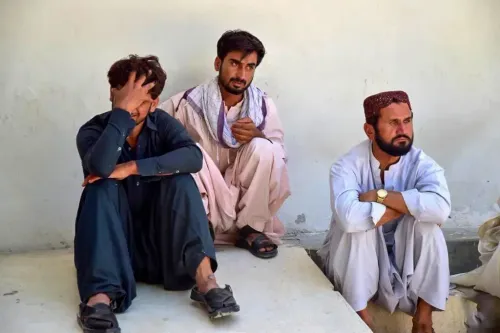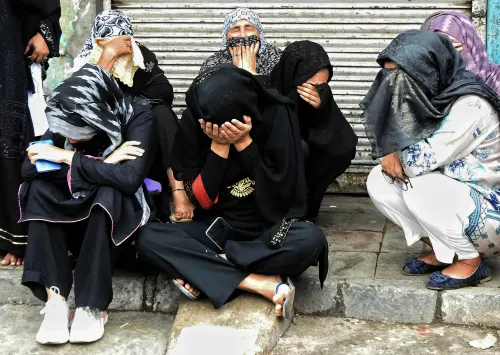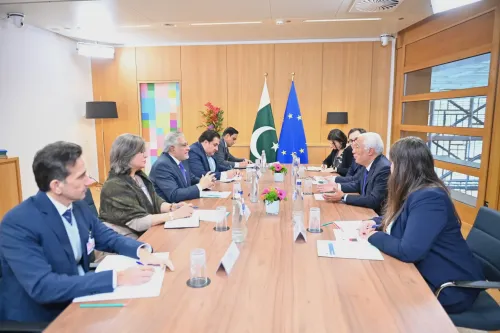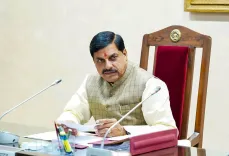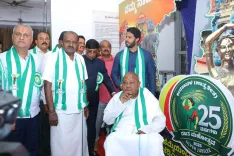Why Does Pakistan Keep Emphasizing Kashmir on Its Independence Day?
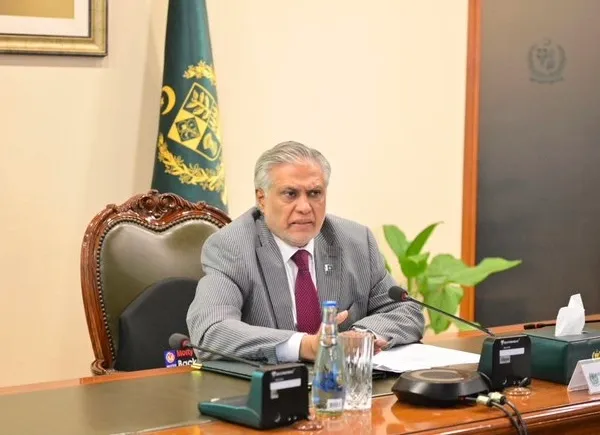
Synopsis
Key Takeaways
- Ishaq Dar emphasizes the importance of unity and commitment to the Kashmir cause.
- Pakistan has made significant strides in various sectors over the past 78 years.
- The Kashmir issue remains a key component of Pakistan’s national identity.
- International reactions to terrorism in the region are critical to Pakistan’s diplomatic efforts.
- Dialogue with the US continues amidst complex geopolitical dynamics.
New Delhi, Aug 14 (NationPress) The Deputy Prime Minister and Foreign Minister of Pakistan, Ishaq Dar, continued his discourse on Kashmir while offering greetings on the occasion of his country’s 79th Independence Day.
He reaffirmed Islamabad’s stance on Kashmir, describing the cause as "just" and asserting that Pakistan’s support for the struggle remains "unwavering until justice is served".
In a statement, Ishaq Dar expressed, "On this celebratory occasion of Independence Day, I extend my heartfelt greetings to the citizens of Pakistan and our fellow countrymen across the globe. Today, we pay tribute to the visionary leadership of Quaid-e-Azam Muhammad Ali Jinnah and the significant sacrifices made by the workers of the Pakistan Movement, whose steadfast determination paved the way for our homeland."
He continued, "Fueled by unity, faith, and discipline, Pakistan stands resilient with over 250 million people, cherishing our shared heritage and collective strength. Over these last 78 years, Pakistan has achieved remarkable progress—from a strong agricultural foundation to flourishing IT exports, from hosting international events to transformative infrastructure initiatives. Our nation has dynamically advanced in science, technology, and economic development, showcasing our commitment to a brighter future and meaningful contributions to global peace."
Addressing Pakistan’s position on regional security, Dar highlighted what he termed a victory of "Marka-e-Haq", asserting that Pakistan demonstrated strength in both military and diplomatic arenas.
"Our principled and strong response to India’s unlawful actions has secured a moral and political victory, reaffirming our commitment to protect our sovereignty. Through military readiness, diplomatic skill, and national unity, we have shown our determination to defend our interests while promoting global peace," he stated.
Reiterating Islamabad’s long-established position on Kashmir, Dar remarked, "The Kashmir cause is just, the rights of the Kashmiri people are inalienable, and Pakistan’s support for their struggle is steadfast until justice is achieved. As we commemorate this day, let’s renew our commitment to a stronger, safer, and prosperous Pakistan."
He emphasized that freedom is something that must be earned and maintained through responsibility, discipline, and unity.
"Freedom is not simply inherited—it must be earned and safeguarded. Our greatest strength lies in the unity that formed our nation and our collective dedication to uphold democracy, peace, and justice. Pakistan is more than just a land; it embodies an enduring idea, a sacred promise, and a shared responsibility," he concluded.
Earlier in the day, amidst rising tensions following the Pahalgam terror attack in Jammu and Kashmir—which was attributed to Pakistan-backed terrorists and resulted in the deaths of 26 tourists—US Secretary of State Marco Rubio extended greetings to Islamabad, expressing that Washington "values Pakistan’s involvement in counterterrorism and trade."
The Pahalgam attack faced widespread condemnation globally. Pakistan Army Chief Field Marshal Asim Munir encountered protests during his visit to the US in May. However, with trade interests escalating—especially after Islamabad allegedly offered access to Balochistan—the Trump administration has initiated renewed diplomatic overtures towards Pakistan.

